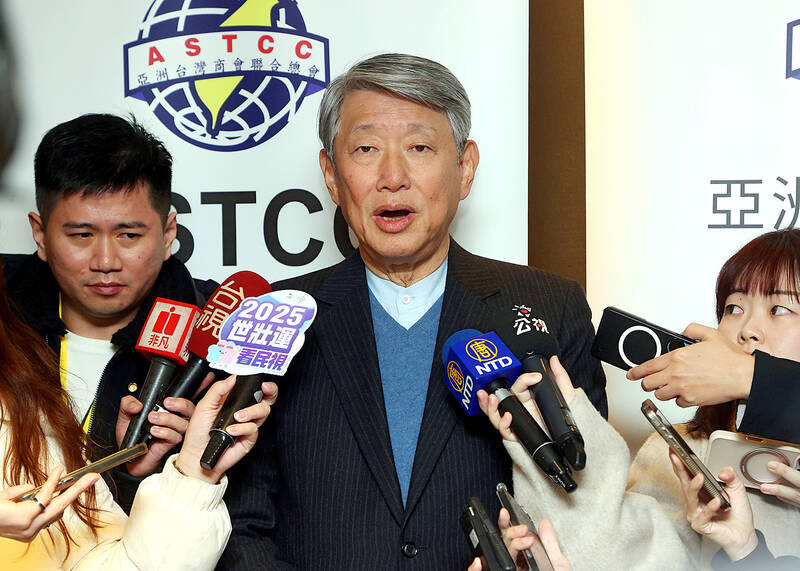Taiwan has sent officials to Washington to discuss possible tariffs that US President Donald Trump might implement, and has made preparations should they be imposed, Minister of Economic Affairs J.W. Kuo (郭智輝) said yesterday.
Tech firms in Taiwan, including the world’s largest contract chipmaker, Taiwan Semiconductor Manufacturing Co (TSMC), face the possibility that Trump would follow through on threats to put tariffs on imported chips.
The president during his campaign had accused Taiwan of “stealing” the US’ semiconductor business.

Photo: CNA
Trump on Friday said he plans to announce reciprocal tariffs on many economies by tomorrow or Tuesday, a major escalation of his offensive to reshape global trade relationships in ways he considers to be in the US’ favor.
Asked about chip tariffs, Kuo said that he had dispatched a deputy minister and a deputy section chief to Washington.
Kuo did not identify the officials, but sources said they could be Deputy Minister of Economic Affairs Cynthia Kiang (江文若) and Industrial Development Administration Deputy Director-General Chen Pei-li (陳佩利).
They are prepared to provide good explanations to Trump’s people about Taiwan’s chip industry, Kuo said.
“Taiwan is the United States’ best partner,” he added.
Taiwan has repeatedly said its chip sector and US companies have a “win-win” cooperation.
Kuo said that TSMC makes semiconductors designed and sold by US businesses, while shouldering the lion’s share of capital expenditures, and that it was a relationship that favors the US.
Taiwan’s manufacturing capabilities is rooted in its know-how and patents from now-defunct Radio Corporation of America, he said, adding that the nation has always respected intellectual property laws.
“We paid for every intellectual property we acquired,” Kuo said. “Taiwan is not the semiconductor tech thief they are looking for.”
Taiwan has been the US’ finest trade partner and the current disagreement likely originated from certain apprehension about the inherent risks of being a part of the chipmaking industry, Kuo said.
Taipei would pursue all available communication channels with Washington, to deal with the ramifications of the Trump administration’s economic policy and shifts in the global trade environment, he said.

Taiwanese can file complaints with the Tourism Administration to report travel agencies if their activities caused termination of a person’s citizenship, Mainland Affairs Council Minister Chiu Chui-cheng (邱垂正) said yesterday, after a podcaster highlighted a case in which a person’s citizenship was canceled for receiving a single-use Chinese passport to enter Russia. The council is aware of incidents in which people who signed up through Chinese travel agencies for tours of Russia were told they could obtain Russian visas and fast-track border clearance, Chiu told reporters on the sidelines of an event in Taipei. However, the travel agencies actually applied

Japanese footwear brand Onitsuka Tiger today issued a public apology and said it has suspended an employee amid allegations that the staff member discriminated against a Vietnamese customer at its Taipei 101 store. Posting on the social media platform Threads yesterday, a user said that an employee at the store said that “those shoes are very expensive” when her friend, who is a migrant worker from Vietnam, asked for assistance. The employee then ignored her until she asked again, to which she replied: "We don't have a size 37." The post had amassed nearly 26,000 likes and 916 comments as of this

New measures aimed at making Taiwan more attractive to foreign professionals came into effect this month, the National Development Council said yesterday. Among the changes, international students at Taiwanese universities would be able to work in Taiwan without a work permit in the two years after they graduate, explainer materials provided by the council said. In addition, foreign nationals who graduated from one of the world’s top 200 universities within the past five years can also apply for a two-year open work permit. Previously, those graduates would have needed to apply for a work permit using point-based criteria or have a Taiwanese company

The Shilin District Prosecutors’ Office yesterday indicted two Taiwanese and issued a wanted notice for Pete Liu (劉作虎), founder of Shenzhen-based smartphone manufacturer OnePlus Technology Co (萬普拉斯科技), for allegedly contravening the Act Governing Relations Between the People of the Taiwan Area and the Mainland Area (臺灣地區與大陸地區人民關係條例) by poaching 70 engineers in Taiwan. Liu allegedly traveled to Taiwan at the end of 2014 and met with a Taiwanese man surnamed Lin (林) to discuss establishing a mobile software research and development (R&D) team in Taiwan, prosecutors said. Without approval from the government, Lin, following Liu’s instructions, recruited more than 70 software